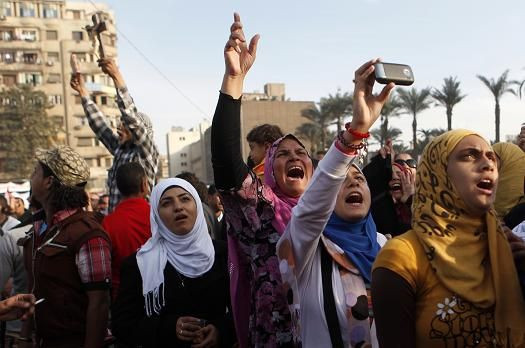Egypt: Is The Opposition Too Fragmented To Unseat Morsi?

As the Dec. 15 constitutional referendum draws nearer, two massive protests, one pro-government and one anti-government, descended on Tahrir Square on Tuesday.
Opposition parties in Egypt are still seeking to get their message out. Problem is, even they don't know what their message is.
Working under the umbrella group the National Salvation Front, the fragmented and disparate opposition has united briefly, but only in their desire to unseat President Mohammed Morsi, says Khaled Elgindy, a fellow at the Saban Center for Middle East Policy at the Brookings Institute. If you're sensing some disjointedness on the part of the opposition, Elgindy said, that's probably because they are disjointed.
"The NSF is an umbrella group, and you can imagine there's a lot of competing interest," Elgindy said. "The opposition in general has not earned a reputation for being a well-oiled machine. It's not uncommon for them to literally speak in different voices saying different things."
Marina Ottoway at the Carnegie Endowment for Peace said the opposition has tried several times to unite. While the NSF may be the most successful attempt to date, she said, it's already beginning to fall apart again.
"For a while it was like a kaleidoscope," Ottoway said with a laugh. "You twirl it one way and some pieces would come together, and the next day you'd twirl it another way, and other pieces would come together."
The opposition's big problem, said Elgindy, is that they don't have a solid vision or plan for how to move forward. Another problem, said Ottoway, is all the leaders of the various factions are all former presidential candidates who are prima donnas and want to be the only leader.
Similarly, said Eric Trager, a fellow at the Washington Institute for US-Middle East policy, all the opposition groups are deeply divided along the lines of the old regime, the "liberals" (who aren't really liberal, Ottoway says), the leftists, the secularists, the Communists, and the Christians, among others. All these factions, Trager said, "have been typically unable to unify in favor of anything, though they can unify against something."
The deep divisions between opposition parties mean it's unlikely that the opposition will be able to gain any kind of electoral momentum, Trager said, much less stop the constitutional referendum or get it voted down. What's more, all these moving kaleidoscopic parts are trying to work against the Muslim Brotherhood, who have the advantage not only of being in power, Elgindy said, but also of being extremely well organized and well resourced.
"The opposition has real concerns about the constitutions on many levels," Elgindy said. "They think it [the constitution] has an Islamist/anti-Islamist binary. And that plays into [the Brotherhood's] message. If people have to choose between their religion and atheism, Egyptians will always choose their faith."
"It's highly unlikely that the referendum will be voted down," Trager said, especially because the opposition parties can't seem to decide whether to tell their supporters to turn out and vote 'no,' or not to turn out in the first place. And after the announcement today, Egypt does have a sufficient number of judges to supervise the referendum, it looks as though it will go ahead, leaving the opposition looking even weaker than before.
"I think it's likely that the constitution will be approved," Ottoway said. "I think that's part of the problem for the opposition. If they were confident, they would be telling their supporters to get out there and vote no."
The lack of confidence by the opposition, and in the opposition by the general populace, will likely translate into problems for future elections.
"The non-Islamists have done no work whatsoever in laying the groundwork to compete electorally with the Brotherhood," Trager said. "Non-Islamists feel shut out by the process, shut out from the creation of [the] constitution, having no prospects for winning [the] referendum or election, and without any [direct access] into Egypt's political structures, [they] will pursue change through other means."
This means, said Trager, that mass protests and instability will be a key feature of Egyptian politics for a very long time.
© Copyright IBTimes 2024. All rights reserved.






















